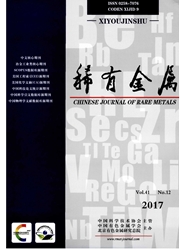

 中文摘要:
中文摘要:
对含钆有机玻璃在180℃条件下进行热氧老化实验,老化时间分别为0.25,0.50,1.00,2.00,3.00,5.00,7.00 d,老化前后的试样采用动态热机械分析仪(DMTA)、悬臂梁冲击试验仪和电动塑料洛氏硬度计进行测试,研究其储能模量、损耗模量、玻璃化转变温度、冲击强度和洛氏硬度的变化规律,同时根据储能柔量的垂直位移因子确定临界失效时间来推算含钆有机玻璃在25℃时的使用寿命。研究结果表明,随着热氧老化时间的延长,含钆有机玻璃的储能模量、玻璃化转变温度和洛氏硬度随热氧老化延长而增大,损耗模量和冲击强度随热氧老化时间增加而减小;根据含钆有机玻璃储能柔量的垂直位移因子确定了临界失效时间为10.56 h;利用从动态力学性能得到的寿命方程计算得到含钆有机玻璃在25℃下的使用寿命约为26.55年。
 英文摘要:
英文摘要:
The gadolinium-containing organic glass was first subjected to thermo-oxidative aging experiment at 180 ℃ for 0.25, 0. 50, 1.00, 2.00, 3.00, 5.00 and 7.00 d respectively, then the samples before and after aging were tested by dynamic mechanical thermal analyzer( DMTA), cantilever beam impact tester and electric plastics Rockwell hardness tester. The variation of its storage modulus, loss modulus, glass-transition temperature, impact strength and Rockwell hardness was analyzed. The critical time which was determined by the vertical displacement factor of the storage compliance was used to calculate the useful llfe of gadolinium-containing organic glass at 25 ℃. The results showed that the storage modulus, glass-transition temperature and Rockwell hardness increased while the loss modulus and impact strength decreased as the thermo-oxidative aging time extended. The critical failure time was 10.56 h determined by the vertical displacement factor of the storage compliance ; the useful life of gadolinium-containing organic glass at 25 ℃ was about 26.55 years calculated by the life equation obtained from the dynamic mechanics performance.
 同期刊论文项目
同期刊论文项目
 同项目期刊论文
同项目期刊论文
 In situ synthesis and characterization of ZnS/epoxy nanocomposites via gas-liquid state reaction met
In situ synthesis and characterization of ZnS/epoxy nanocomposites via gas-liquid state reaction met Novel synthesis and high visible light photocatalytic activity of SnS(2) nanoflakes from SnCl(2)cent
Novel synthesis and high visible light photocatalytic activity of SnS(2) nanoflakes from SnCl(2)cent Characterization of mechanical properties of epoxy resin reinforced with submicron-sized ZnO prepare
Characterization of mechanical properties of epoxy resin reinforced with submicron-sized ZnO prepare Green hydrothermal synthesis and optical absorption properties of ZnO(2) nanocrystals and ZnO nanoro
Green hydrothermal synthesis and optical absorption properties of ZnO(2) nanocrystals and ZnO nanoro High-Performance Visible-Light-Driven SnS(2)/SnO(2) Nanocomposite Photocatalyst Prepared via In situ
High-Performance Visible-Light-Driven SnS(2)/SnO(2) Nanocomposite Photocatalyst Prepared via In situ Size-Tunable Hydrothermal Synthesis of SnS(2) Nanocrystals with High Performance in Visible Light-Dr
Size-Tunable Hydrothermal Synthesis of SnS(2) Nanocrystals with High Performance in Visible Light-Dr Size-controlled hydrothermal synthesis of Sns(2) nanoparticles with high performance in visible ligh
Size-controlled hydrothermal synthesis of Sns(2) nanoparticles with high performance in visible ligh 期刊信息
期刊信息
